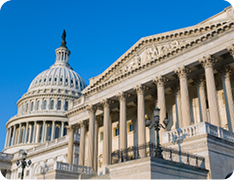 With the severe funding cuts outlined in President Donald Trump’s proposed budget, it’s more important than ever for not-for-profits to advocate for themselves on the federal stage.
With the severe funding cuts outlined in President Donald Trump’s proposed budget, it’s more important than ever for not-for-profits to advocate for themselves on the federal stage.
Before engaging in lobbying or political activities, not-for-profits will want to determine which activities are allowed, given the different tax implications. Entities can manage risk and protect their tax-exempt status by understanding the complex rules that govern their lobbying and political activities.
Understanding Lobbying Restrictions
Lobbying is an activity in support of or in opposition to legislation. It’s different from political activities, which are activities supporting or opposing a candidate for elective office.
As lobbying efforts ramp up, not-for-profits will want to be aware of how different tax-exempt entities’ activities are limited by regulatory agencies—including the IRS, Federal Election Commission (FEC), and state or local agencies. They also need to be aware of the restrictions on different tax-exempt organizations.
- 501(c)(3) organizations. These are groups that operate for religious, charitable, scientific, or educational purposes and can’t engage in a substantial amount of lobbying activity. It’s important to note that unlike a 501(c)(3) organization treated as a public charity, private foundations within the meaning of IRC Section 509(a) may not make expenditures for lobbying.
- 501(c)(4) organizations. These are commonly called social welfare organizations. They may engage in lobbying and other political activities, as long as these activities don’t become their primary purpose.
- 501(c)(5) organizations. These are labor and agricultural groups. They may engage in lobbying and other political activities, as long as these activities don’t become their primary purpose.
- 501(c)(6) organizations. These are business leagues, chambers of commerce, real estate boards, and boards of trade. They may engage in lobbying and other political activities, as long as these activities don’t become their primary purpose. A violation of these prohibitions may result in the denial or revocation of an organization’s tax-exempt status and the imposition of certain excise taxes.
501(c)(3) Organizations
501(c)(3) organizations can mitigate the risk of having their tax-exempt status revoked by filing Form 5768, Election/Revocation of Election by an Eligible Section 501(c)(3) Organization to Make Expenditures to Influence Legislation. An organization making this election will, however, be subject to an excise tax under Section 4911 if it spends more than the amount permitted by that section. The election also creates a higher threshold for what the IRS deems insubstantial lobbying.
This election requires the organization to file Schedule C Part II-A with its annual Form 990 filing to report actual and permitted lobbying and grassroots expenditure amounts.
501(c)(3) public charities are only allowed to engage in an insubstantial amount of lobbying activity, however some voter registration activities are permitted, such as nonpartisan voter education, voter registration, and general promotion of the electoral process.
501(c)(4), (5), & (6) Organizations
501(c)(4), (5), and (6) organizations are allowed to engage in the following activities:
- Creation of separate segregated funds. A political committee that’s established and administered by corporations, labor unions, membership organizations, or trade associations. They can only solicit contributions from individuals associated with connected or sponsoring organizations.
- Creation of nonconnected committees. An unsponsored political committee designed to be financially independent. They’re capable of soliciting contributions from the public.
- Political activity expenditures. These are allowed only as long as they’re not the organization’s primary activity.
- Lobbying. Any activity in support of or in opposition to legislation.
527 Organizations
Section 527 of the Internal Revenue Code (IRC) grants tax-exempt status to parties, candidates, committees, or associations organized for the purpose of influencing an issue, policy, appointment, or election, be it federal, state, or local. These political organizations can raise unlimited funds from individuals, corporations, or labor unions.
A political action committee (PAC) is a popular term for a political committee organized for the purpose of raising and spending money to elect and defeat candidates. All political committees that register and file reports with the FEC are 527 organizations, but not all 527 organizations are required to file with the FEC.
At the time of formation, a 527 organization may be required to register with the FEC or IRS using Form 8871. Depending on the organization, it may be subject to one or more filing requirements, such as FEC filings, Form 1120-POL, Form 8872, or Form 990. Political organization will benefit from careful consideration of these filing requirements.
Filing Form 1120-POL
Politically active 501(c) entities often run into the question of whether they need to file Form 1120-POL, US Income Tax Return for Certain Political Organizations.
A 501(c)(4), (5), or (6) organization is required to file a Form 1120-POL if it has political organization taxable income under IRC Section 527(f)(1). Taxable income for these exempt organizations is the smaller of the net investment income of the organization for the tax year or the amount spent on an exempt function during the tax year—either directly or indirectly through another organization.
We're Here to Help
For more insight into how lobbying or political activities might affect your organization’s tax-exempt status, contact your Moss Adams professional.